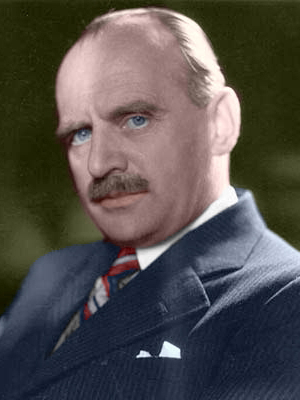November 2015 marks the 40th anniversary of the death of Petr Zenkl, one of the most important figures of Czechoslovak democracy, as leader of the anti-communist movement in exile in the USA during the Cold War. Today, Zenkl´s name is almost unknown to the broader public, along with many others who steadfastly defended freedom and democratic values. A quarter century after the fall of the Iron Curtain, this is a poor reflection on the state of Czech historical memory.
Petr Zenkl was born in 13. 6. 1884 in Tábor, Austria-Hungary and died on 3. 11. 1975 in Raleigh, North Carolina, USA. From 1948 to1972, Zenkl was perhaps the most prominent personality of the exile community outside of Czechoslovakia. Even after his retirement, Zenkl fought tirelessly against communist tyranny as leader of the Council of Free Czechoslovakia in trying to make it the chief umbrella organization of the Czechoslovak exile community. Zenkl actively assisted refugees who fled to the West, along with lecturing and publishing warnings on the dangers of Communism. Perhaps most notably, Zenkl´s beliefs and experiences characterize the Czechoslovak Cold war immigration movement, its unfulfilled hopes, failures and disillusionment.
Zenkl was a teacher by profession, participating in the anti-Habsburg resistance. He began his career as mayor of Prague’s Karlín district, manager of the social welfare service and one of the architects of the modern Czech social insurance system. In due course, he became mayor of Prague and for a few weeks in 1938 – a minister in two governments. Zenkl was a devout follower of the humanistic philosophy of Czechoslovakia’s first two presidents T.G. Masaryk and Edvard Beneš. During WWII he was a prisoner at the Buchenwald concentration. Following the war, he was elected Chairman of the National Socialist Party (Československá strana národně socialistická), re-elected as mayor of Prague, while serving as Vice-president of the Czechoslovak government. At this time, he was a tireless fighter against Communism and one of the loudest supporters of the democratic camp.
That all came to an end with the Communist coup on 25th February 1948. Although closely guarded by the StB, he and his wife Pavla managed to flee abroad with help from friends and the U.S. Embassy in Prague. Zenkl eventually settled in the United States, where he met a number of other former Czechoslovak politicians, colleagues and National Socialist party members.
Zenkl was not alone. From 1947 until March 1948, approximately two hundred thirty-six thousand Czechoslovaks, including scientific, cultural and political elites (thirty five Parliament members, twelve ambassadors and ministers, twelve consuls, one hundred diplomats, eighteen generals of the army and air force, and hundreds of public officials) fled to the West due to political, religious and other non-economic reasons.
Their exile wave is today labeled as the “third exile wave ” by contemporary historians. The first wave occurred in the years 1914-1918 during World War I, when Czech patriots and democrats fled to work on creating an independent Czechoslovak state that would emerge from the war. They succeeded. The second exile was between 1938-1945 and consisted of those fleeing the Nazi regime.
Thus, at the beginning of 20th century there were more than 350 000 people of Czech ancestry, already living in the USA. They built strong, supportive communities in Chicago (after Prague and Vienna, the third most populous Czech city in the world), Cleveland and New York. These American compatriots financially supported the founding of the Czechoslovak Republic in 1918. Two decades later, they provided millions of dollars for the liberation of Czechoslovakia from Nazi rule. However, when the “third wave” exiles, above all the former politicians, came to the USA in 1948, their compatriots did not welcome them with open arms. There was a feeling that Czechoslovak democracy had been lost because of the strong political ambitions and personal failures of these people, including Petr Zenkl. After some time passed, American Czechs began to cooperate with the post-1948 émigrés in the fields of culture, art and education, but politically, differences and antagonisms remained. Zenkl, as a distinguished exile leader, could not rely on the help of American compatriots, who invited him for public lectures and meetings, but frequently considered him an untrustworthy bankrupt politician, and a guilty party in the loss of Czechoslovakia´s freedom. This explains why the third exile wave was once called the “exile of the unfulfilled hopes.”
The fight to free Czechoslovakia lasted more than 40 years. In 1968, a new wave of emigrés from Czechoslovakia arrived in the US. However, as they lived some twenty years under the hammer and sickle, they had no experience with the idealized Masaryk First Republic. Their political views were completely different, when compared to the “old guard,” with Zenkl at its head. The two groups clashed over many issues, and it took some years before a common understanding came into being. Zenkl remained trapped in his past and, because of his age and health, could not play a significant role, and fell into obscurity.
Forty years after Zenkl´s death and twenty-five years after the fall of the Iron Curtain, there is a great opportunity to restore some balance. Zenkl serves as a powerful example of a figure who spent long years fighting Communism from exile. However, few of his contemporaries fared much better, though there are slight exceptions. Zenkl´s fellow émigrés Pavel Tigrid is the only example of the post 1948 exile generation who returned to become a high-ranking politician (as Minsiter of Culture from 1994-1996). Czechoslovakia’s best independent journalist Ferdinand Peroutka is rarely mentioned after 1948, though he was Director of the Czechoslovak board of Radio Free Europe in New York. There are many others, including Jožka Pejskar, Ján Papánek, Marie Provazníková, Otakar Machotka, Radomír Luža, František Klátil, Jan and Jaroslav Stránský, Jiří Škvor, Ota Hora, Eduard Táborský, all of whom deserve more research and renown. Only a few living witnesses to the lives of these people remain.
published: 30. 10. 2015







